DAY 1: 24 July (Tue)
9:00-9:15 Opening Session
Opening
Room 503
Welcome Remarks
- Prof. Hironori Hamanaka, Chair of the Board of Directors, IGES
Guest Remarks
- Mr. Tatsushi Terada, Vice-Minister for Global Environmental Affairs, Ministry of the Environment, Government of Japan
- Mr. Masao Kurokawa, Vice Governor, Kanagawa Prefectural Government
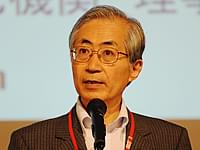
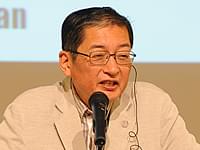
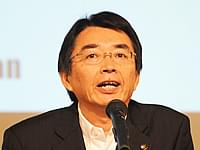
9:15-10:45 Plenary Session 1
Green Economy for Sustainable Development
Room503 / P-1
 Through the process of Rio+20, a green economy is now recognised as an important tool available for achieving sustainable development. Positive expectations include its contribution to poverty eradication, economic growth, social inclusion, human welfare, employment and decent work. On the other hand, there are concerns about risks that need to be carefully avoided, for example, the concept and practice of green economy could be taken as unjustifiable discrimination or disguised restriction on finance and international trade. This session addresses how the global trend for shifting towards green economy may affect decisions and actions taken by countries and relevant organisations from diverse perspectives including climate change, energy security, and funding.
Through the process of Rio+20, a green economy is now recognised as an important tool available for achieving sustainable development. Positive expectations include its contribution to poverty eradication, economic growth, social inclusion, human welfare, employment and decent work. On the other hand, there are concerns about risks that need to be carefully avoided, for example, the concept and practice of green economy could be taken as unjustifiable discrimination or disguised restriction on finance and international trade. This session addresses how the global trend for shifting towards green economy may affect decisions and actions taken by countries and relevant organisations from diverse perspectives including climate change, energy security, and funding.Moderator
- Prof. Hironori Hamanaka, Chair of the Board of Directors, IGES
Keynote Speakers
- Dr. Rajendra K. Pachauri,Director-General, The Energy and Resource Institute (TERI) / Chair, The Intergovernmental Panel on Climate Change (IPCC) PDF(2.8MB)
- Dr. Bindu N. Lohani,Vice President, Knowledge Management and Sustainable Development, Asian Development Bank (ADB)
Discussant
- Dr. Naoko Ishii,Deputy Vice Minister of Finance for International Affairs, Ministry of Finance, Government of Japan
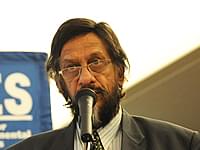
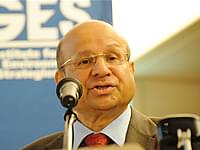
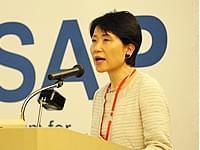
11:00-12:30 Parallel Sessions
East Asia Knowledge Platform for Low Carbon Growth
- Knowledge in Action for Policy and Investment
- Knowledge in Action for Policy and Investment
Room 503 / S1-1
If rapidly growing Asian countries fail to make investments towards low-carbon societies in an intensive manner, they will be locked into carbon-intensive development paths for the upcoming half-century. Therefore, it is imperative that we orchestrate our knowledge and expertise from around the region as well as the necessary funds in order to steer towards low-carbon and green growth societies in an urgent fashion. On the occasion of the ISAP2012, we would like to engage in frank discussion on how to forge consensus in moving towards low-carbon societies, exchange necessary knowledge, build a substantial linkage between that knowledge and policies, and facilitate wise and effective investments towards low-carbon sustainable societies in a way that fosters active participation from like-minded stakeholders concerned.
- Discussion point PDF(43KB)
- Discussion point PDF(43KB)
Related Link
Moderator
- Mr. Hideyuki Mori, President, IGES
Keynote Speaker
- Mr. Masaya Fujiwara,Principal Fellow, Programme Management Office, IGES PDF(1.4MB)
- Mr. Junya Nakano,Senior Negotiator, Climate Change Division, International Cooperation Bureau, Ministry of Foreign Affairs PDF(440KB)
Speakers
- Dr. Shuzo Nishioka,Secretary General, International Research Network for Low Carbon Societies (LCS-RNet) / Senior Research Advisor, IGES PDF(2.0MB)
- Dr. Junichi Fujino,Senior Researcher, Center for Social and Environmental Systems Research, National Institute for Environmental Studies (NIES) PDF(1.4MB)
- Mr. Kyosuke Inada,Deputy Head and Advisor, Office for Climate Change, Global Environment Department, Japan International Cooperation Agency (JICA) PDF(1.5MB)
Discussants
- Dr. Rajendra K. Pachauri,Director-General, The Energy and Resource Institute (TERI) / Chair, The Intergovernmental Panel on Climate Change (IPCC)
- Dr. Bindu N. Lohani,Vice President, Knowledge Management and Sustainable Development, Asian Development Bank (ADB)
- Mr. Ash Sharma,Vice President, Carbon Finance and Funds, Nordic Environment Finance Corporation (NEFCO)
- Prof. Rizaldi Boer,Executive Director, Centre for Climate Risk and Opportunity Management in Southeast Asia and Pacific, Bogor Agriculture University, Indonesia
- Prof. Jiang Kejun,Research Professor, Energy Research Institute, National Development and Reform Commission, PRC
- Prof. Ram Manohar Shrestha,Emeritus Professor, Asian Institute of Technology
Urban Challenges for a Green and Smart Economy
Room 502 / S1-2
Measures towards a “Green Economy” are taken around the globe including Japan. In this session, the business model for “smart cities” will be outlined, followed by actual measures taken by Iskandar Malaysia, Yokohama city and Kawasaki city. The aim of the session will be to highlight and discuss issues that need to be handled along with directions of future policies in order to achieve a green economy. In addition, this session aims at stimulating new measures towards a “Green Economy” with the common understanding generated by the discussion.
Documents
Moderator
- Prof. Hidefumi Imura, Senior Policy Advisor & Senior Fellow, Programme Management Office, IGES
Keynote Speaker
- Mr. Yosuke Mochizuki, Director, Nikkei BP CleanTech Institute PDF(2.1MB)
Speakers
- Prof. Dr. Ho Chin Siong,Deputy Director, Office International Affairs, Universiti Teknologi Malaysia PDF(2.1MB)
- Mr. Masato Nobutoki,Executive Director for the FutureCity Promotion, City of Yokohama PDF(1.0MB)
- Ms. Yoko Maki,Executive Director, Global Environment Knowledge Centre, Environment Bureau, Kawasaki City PDF(1.6MB)
Panellists
- Prof. Wanxin Li,Assistant Professor, City University of Hong Kong, China
- Dr. Akira Ogihara,Senior Coordinator, Governance and Capacity Group, IGES
- Dr. Abdessalem Rabhi,Policy Researcher, Kansai Research Center, IGES
- Mr. Lewis Akenji,IGES Fellow
Sustainable Development Goals - The Road Ahead
Room 411+412 /
S1-3
S1-3
A broad framing of the future SDGs was agreed in Rio. The coming years will be defining if the goals can help reorient global economic and development activities onto the right path towards sustainability. Implementation toward these goals necessitates better monitoring and governance mechanisms. At this critical juncture, 20 years after the Rio Earth Summit, we will discuss how important it is to look at similar efforts in the past and draw lessons and identify barriers to their effective implementation. We must also find ways to effectively operationalise the goals, targets and indicators at national and local levels, to achieve sustainable development.
Moderator
- Prof. Norichika Kanie,Associate Professor, Department of Value and Decision Science, Graduate School of Decision Science and Technology,Tokyo Institute of Technology PDF(362KB)
Speakers
- Mr. Surendra Shrestha,Director & Focal Point for Sustainable Development Goals (SDGs) at Rio+20 Secretariat PDF(726KB)
- Ms. Masnellyarti Hilman,
- Dr. Atsushi Suginaka,Director, Global Environment Division, International Cooperation Bureau, Ministry of Foreign Affairs PDF(279KB)
- Dr. Mark Elder,Director, Governance and Capacity Group, IGES PDF(704KB)
- Mr. Tetsuro Yoshida,Researcher, Governance and Capacity Group, IGES PDF(352KB)
12:40-14:05 Lunch Session
UNEP GEO5 / Global Outlook on SCP Policies Presentation
Room 502 / L-1
The audience will have a unique opportunity to hear about two of UNEP’s major publications -the flagship Global Environmental Outlook (GEO5), and the Global Outlook on Sustainable Consumption and Production (GO SCP). IGES researchers were closely involved in the publication of the regional chapters and together with UNEP will present the major findings followed by exchange between the two presenters on commonalities and implications for Asia-Pacific.
Related Links
Moderator
- Dr. Peter King, Senior Policy Advisor, IGES Regional Centre, Bangkok
Speakers
- Ms. Anna Stabrawa,Regional Coordinator for Early Warning & Assessment, United Nations Environment Programme (UNEP) PDF(4MB)
- Mr. Lewis Akenji,IGES Fellow PDF(2.3MB)
Discussants
- Dr. Young-Woo Park,Regional Director & Representative for Asia and the Pacific, United Nations Environment Programme, Regional Office for Asia & the Pacific (UNEP-ROAP)
- Dr. Bindu N. Lohani,Vice President, Knowledge Management and Sustainable Development, Asian Development Bank (ADB)
14:15-15:45 Plenary Session 2
Resilience: Key Element for Building Sustainable Society
Room503 / P-2
 Resilience is identified as one of the key elements of sustainable development. Recovery from the triple disasters in Tohoku region in Japan, including Fukushima, remains an enormous challenge, while many Asian countries face the urgent need to enhance resilience for diverse issues including climate change adaptation. This session will welcome a former Environment Minister from Germany and the Director of the Division of Regional Cooperation at UNEP to share perspectives on resilience and natural disasters.
Resilience is identified as one of the key elements of sustainable development. Recovery from the triple disasters in Tohoku region in Japan, including Fukushima, remains an enormous challenge, while many Asian countries face the urgent need to enhance resilience for diverse issues including climate change adaptation. This session will welcome a former Environment Minister from Germany and the Director of the Division of Regional Cooperation at UNEP to share perspectives on resilience and natural disasters.Moderator
- Mr. Kazuhiko Takemoto, Senior Advisor to Minister of the Environment / Senior Fellow, Head of the Education, Sustainability and Ecosystem Assessment Programme, UNU-IAS
Keynote Speakers
- Prof. Dr. Klaus Töpfer,Executive Director, Institute for Advanced Sustainability Studies e.V. (IASS) PDF(522KB)
- Prof. Kazuhiko Takeuchi,Vice Rector, United Nations University (UNU) PDF(2.3MB)
- Ms. Tomoko Nishimoto,Director, Division of Regional Cooperation (DRC), United Nations Environment Programme (UNEP)

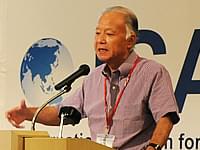
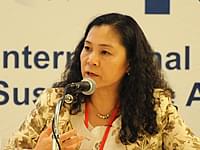
16:00-17:30 Parallel Sessions
Effective Decontamination in Fukushima and Experiences in Europe
Room 503 / S2-1
After the Chernobyl nuclear accident in 1986, actions were taken by various countries in Europe to implement decontamination, and following this, a total of 50 research and disaster-related organisations from 23 countries under the European Commission took part in the development of an on-line system and set of guidelines for emergency decision support. Inviting experts from Europe based on their experience and knowledge developed in Europe as well as field survey in Fukushima, this session promotes public discussion on how to best proceed effectively with full-scale decontamination on a national and local level from this fiscal year.
Moderator
- Mr. Hideyuki Mori, President, IGES
Keynote Speakers
- Dr. Hiroshi Suzuki,Emeritus Professor, Fukushima University / Chair, Fukushima Prefecture Reconstruction Committee PDF(390KB)
- Mr. Kuniaki Makiya,Deputy Director General for Decontamination, Ministry of the Environment, Japan PDF(656KB)
- Mr. Masamitsu Kogota, Senior Policy Administrator of Environmental Recovery Sector, Social Affairs & Environment Department, Fukushima Prefectural Government PDFS(150KB)
Panellists
- Dr. Viktor Averin, Director, Research Institute of Radiology, Belarus PDF(4.7MB)
- Mr. Gilles Heriard-Dubreuil,President, MUTADIS, France PDF(116KB)
- Prof. Wolfgang Raskob,Professor, Karlsruhe, Institute of Technology (KIT), Germany PDF(210KB)
- Prof. Eduardo Gallego,Director, Nuclear Engineering Department, Technical University of Madrid, Spain PDF(162KB)
- Prof. Dr. Miranda A. Schreurs,Director of the Environmental Policy Research Institute, The Freie Universitat Berlin PDF(522KB)
- Prof. Sachihiko Harashina,Professor, Faculty of Policy Informatics, Chiba University of Commerce / Professor Emeritus, Tokyo Institute of Technology
The Satoyama Initiative and Resilience
- Pathways to a Sustainable Society -
- Pathways to a Sustainable Society -
Room 502 / S2-2
To cope with the rising pressures of environmental change, global biodiversity loss, and extreme natural hazards such as the Great East Japan Earthquake and Tsunami, societies need to build and enhance the resilience in the face of future disturbances. The Satoyama Initiative aims to conserve sustainable human-influenced natural environments (Socio-Ecological Production Landscapes and seascapes; SEPLs) through broader global recognition of their value. Its focus on the scientific aspects of human-nature interactions in SEPLs provides insight into the importance of promoting resilience. This session will illustrate the diverse benefits obtained through SEPLs and explore possible means to integrate this notion within environmental policy decisions.
Related Links
- Article:"Deep roots of community resilience" by Robert Blasiak, Sana Okayasu and Ikuko Matsumoto(in UNU OneWorld 2.0)
- Session Report in Satoyama Initiative Website
Moderator
- Prof. Alfred Oteng-Yeboah, National Chairman, Ghana National Biodiversity Committee
Panellists
- Dr. Krishna Chandra Paudel,Secretary, Eastern Regional Administration Office, Ministry of Home Affairs, Government of Nepal PDF(1.0MB)
- Ms. Joji Cariño,Policy Advisor and Team Leader, Indigenous Peoples Capacity-Building Project for CBD Implementation, Indigenous Peoples’ International Centre for Policy Research and Education (TEBTEBBA) PDF(216KB)
- Mr. Katsuhiko Tada,President, Tada Organic Farm Co., Japan
Discussants
- Dr. Ryo Kohsaka,Visiting Research Fellow, United Nations University Institute of Advanced Studies (UNU-IAS) (Operating Unit Ishikawa Kanazawa:OUIK) / Associate Professor, Faculty of Human Sciences, Institute of Human and Social Sciences, Kanazawa University
- Dr. Kalemani Jo Mulongoy,Visiting Professor, United Nations University Institute of Advanced Studies (UNU-IAS)
Energy Efficient Housing in Asia - Barriers and Policy Drivers
Room 411+412 /
S2-3
S2-3
The combination of rapidly changing urban housing patterns and concerns over energy security makes energy-efficient housing (EEH) a critical issue for developing Asia. We must discuss the barriers that stakeholders face in uptake, and how government policies can facilitate a transition to more sustainable housing. This session addresses the above questions, drawing from initial findings from research projects currently being implemented in China, India, Thailand and the Philippines.
Moderator
- Dr. Magnus Bengtsson, Director, Sustainable Consumption and Production Group, IGES
Speakers
- Mr. Lewis Akenji,IGES Fellow
- Dr. Patrick Schroeder,International Advisor, China Association for NGO Cooperation (CANGO), China
- Mr. Sangeeth Varghese,Chairman and Managing Director, LeadCAP Knowledge Solutions Private Limited, India
- Mr. Fei Guo,Researcher, Sustainable Consumption and Production Group, IGES
Discussants
- Prof. Hidefumi Imura,Senior Policy Advisor & Senior Fellow, Programme Management Office, IGES
- Ms. Ikuyo Kikusawa,Policy Researcher, IGES Kitakyushu Urban Centre
Resilient Energy System towards Green Economy
(Japanese only)
(Japanese only)
Room 414+415 /
S2-4
S2-4
The Great East Japan Earthquake and the Fukushima nuclear accident revealed the necessity of resilient energy system to realise green economy. Based on recent energy scenario studies including an IGES study, this session will discuss key challenges and necessary actions to promote resilient energy system in wider perspective including a resilient regional economy as well as a resilient energy supply against disasters.
Moderator
- Dr. Satoshi Kojima, Director, Economy and Environment Group, IGES
Keynote Speakers
- Prof. Hiroyuki Uesaka,Professor, Faculty of Child Development and Education,Toyama University of International Studies PDF(1.3MB)
- Dr. Takeshi Kuramochi,Associate Researcher, Climate Change Group, IGES PDF(357KB)
Panellist
- Prof. Hiroki Hondo,Professor, Graduate School of Environment and Information Sciences, Yokohama National University PDF(Japanese)(419KB)



 Go to top of page
Go to top of page